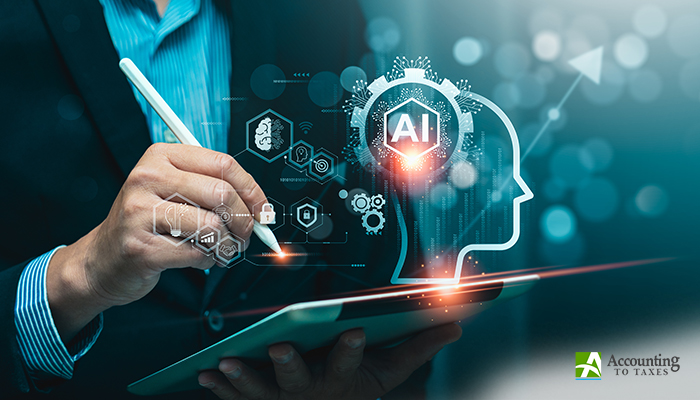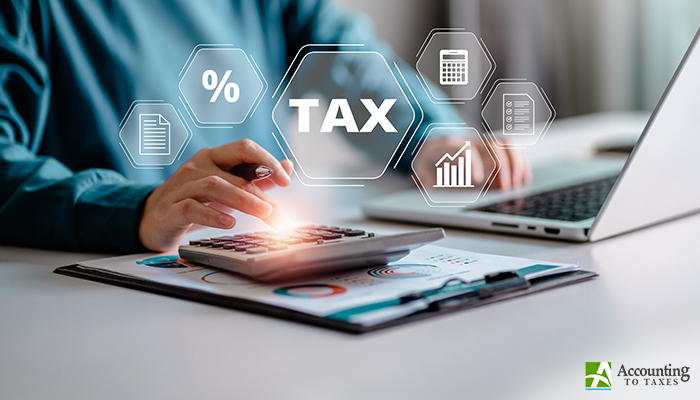In a rapidly evolving landscape, the inevitability of AI’s impact on our lives cannot be denied. Rather than turning a blind eye to the swift advancements around us, it’s crucial to embrace them and discover how they can work to our advantage. For business owners and accountants alike, remaining competitive and up-to-date is essential for achieving success. Failing to harness the potential of AI in tax and accounting services could lead to lagging behind competitors, grappling with inefficient and outdated processes, facing compliance issues, and missing out on growth opportunities.
To keep you at the forefront, our team at Accounting to Taxes is providing invaluable insights into the impact AI on tax and accounting services best practices, top benefits, and a glimpse into the future of accounting empowered by AI.
Statistical Representation of AI in Tax and Accounting Services
- Across the globe, both large corporations and small businesses are implementing AI solutions to enhance efficiency.
- Projections suggest that AI platforms will collectively reach a value of $1.2 trillion by 2020, with investments in machine learning technologies expected to triple.
- A survey by PwC reveals that 30% of respondents anticipate AI to be the most significant innovation in the accounting industry within the next five years.
- This indicates a widespread acknowledgment of AI’s potential to reshape traditional practices and drive transformative changes across industries.
Impact of Leveraging AI in Accounting and Tax Services
-
Automating Tax Return Preparation and Filing
One significant application of AI in tax and accounting services lies in automating the preparation and filing of tax returns. AI-powered tax preparation software, either independently or in conjunction with Robotics Process Automation (RPA), plays a pivotal role in this regard. These sophisticated systems accurately extract relevant data directly from sources such as trial balances, invoices, and other pertinent documents. Subsequently, they organize this data into the requisite tax forms.
Through the utilization of machine learning algorithms, these AI-powered solutions also conduct thorough analyses of tax returns, identifying errors or discrepancies. This automation reduces the time and resources previously allocated to manual data entry tasks, thereby enabling staff to redirect their efforts towards more strategic and value-adding activities.
-
Monitoring Tax Compliance and Improvement
Another crucial area where AI demonstrates its utility is in the monitoring of tax compliance and facilitating improvement initiatives. Given the frequent changes and updates in tax regulations, AI serves as a valuable tool for businesses to stay abreast of new developments. These AI-enabled monitoring tools ensure timely and regular updates, enabling businesses to avoid noncompliance issues that may result in significant tax assessments and reputational risks.
Additionally, AI aids in enhancing tax compliance by analyzing vast datasets to identify trends and patterns indicative of potential tax-related issues. This proactive approach empowers businesses to address compliance concerns preemptively, mitigating the risk of substantial tax assessments and the associated resource drain.
-
Enhancing Tax Audit Processes and Fraud Detection
AI also plays a pivotal role in enhancing tax audit processes and bolstering fraud detection mechanisms. By leveraging AI, businesses can improve their audit readiness by analyzing past audit outcomes to identify areas of weakness and enhance compliance.
Moreover, tax authorities can harness AI technologies to streamline tax audits and detect instances of potential fraud. Through the analysis of extensive datasets, AI in tax and accounting services can identify anomalies and suspicious activities, thereby enabling tax authorities to pinpoint potential instances of fraudulent behavior effectively.
-
Forecasting and Predictive Analytics
The utilization of AI for forecasting and predictive analytics represents another significant area of opportunity within tax operations. By leveraging predictive analytics, businesses can analyze historical tax data to formulate effective business strategies and make informed decisions regarding tax planning and forecasting.
Through the identification of trends and patterns within various tax filing cycles, AI-driven algorithms can provide invaluable insights into future tax obligations, facilitating more accurate sales forecasts and tax planning initiatives. Consequently, businesses can optimize their operations, identify areas for improvement, and make data-driven decisions to enhance profitability.
Top Benefits of AI in Accounting
-
Improved Record Accuracy
AI-driven automation ensures a high level of accuracy in record-keeping processes, mitigating the risks associated with human error in manual data entry tasks. By automating data entry processes, AI ensures that records are consistently up-to-date and audit-ready, thereby enhancing compliance with internal, local, state, and federal regulations.
-
Increased Focus of Finance Team Expertise
By automating time-consuming tasks such as transaction categorization and reconciliation, AI enables finance teams to redirect their focus towards more complex and strategic activities. This allows accounting professionals to leverage their expertise in financial analysis and modeling, thereby enhancing the overall effectiveness of the finance function within an organization.
-
Advanced Financial Insights
AI-driven automation facilitates the instantaneous delivery of financial insights, eliminating the need to wait for month-end reporting cycles. Through the utilization of machine learning and natural language processing (NLP) technologies, AI can analyze financial data and provide actionable insights in real-time. This enables businesses to make informed decisions and take immediate action on areas requiring attention, thereby enhancing operational efficiency and driving business growth.
-
Cost Savings
The adoption of AI and robotic process automation (RPA) in financial services can lead to significant cost savings for businesses. By automating repetitive and time-consuming tasks such as data entry, transaction categorization, and reconciliation, AI helps businesses streamline their financial processes and reduce operational costs.
Estimates suggest that the adoption of AI and RPA technologies can reduce financial services costs by up to 80%, making it a cost-effective solution for businesses seeking to optimize their financial operations.
The Future of AI in Accounting
In a nutshell, the market demand for AI-driven accounting automation is on a trajectory of significant growth, fueled by the recognition of its benefits in enhancing operational efficiency and facilitating business growth. This trend is expected to lead to the emergence of multiple billion-dollar bookkeeping automation businesses in the near future.
However, it is crucial to understand that while AI can streamline processes and increase accuracy, it cannot replace human intelligence and judgment in financial management. The future of AI accounting and tax services lies in the collaboration between machines and humans, where AI-powered tools complement the expertise of finance professionals, ultimately enabling businesses to achieve optimal results.
As we move forward, embracing this collaborative approach will be vital to unlocking AI’s full potential in bookkeeping and financial management.
If you are looking for an expert and reliable outsourced accounting firm to help you with your accounting books during tax season, contact Accounting To Taxes. We have years of experience delivering round-the-clock accounting support to CPAs, businesses, and accounting firms. Call us today.









